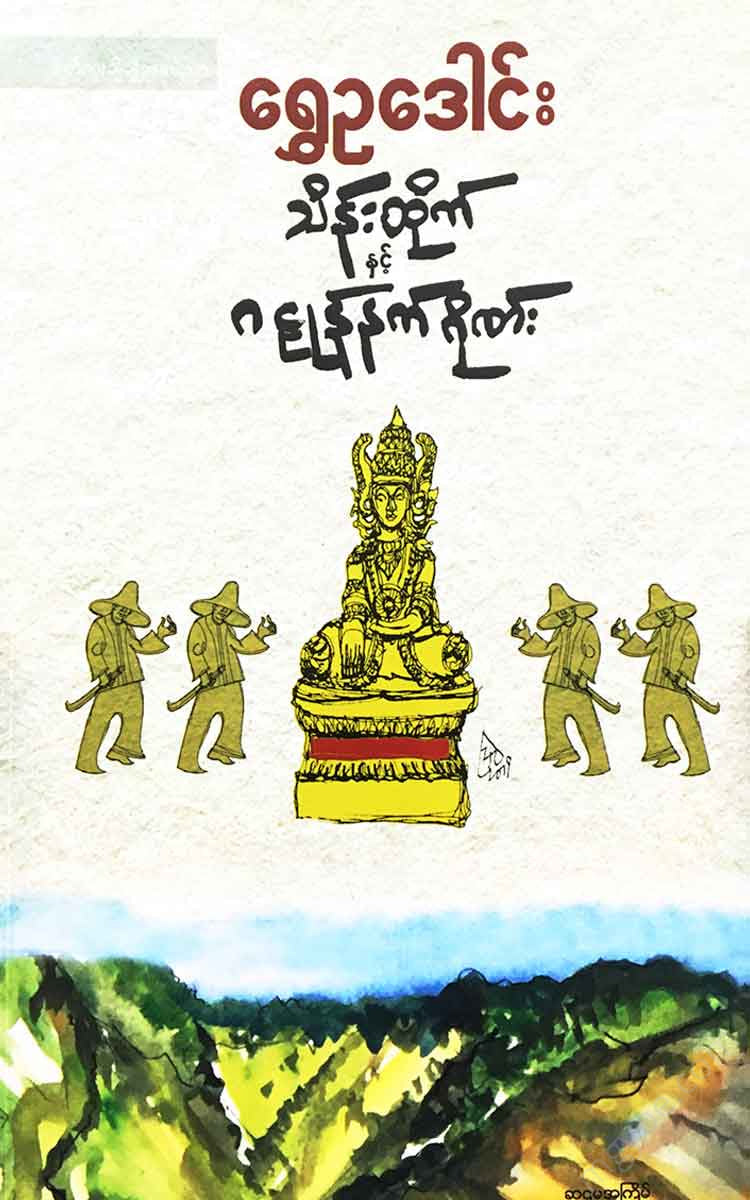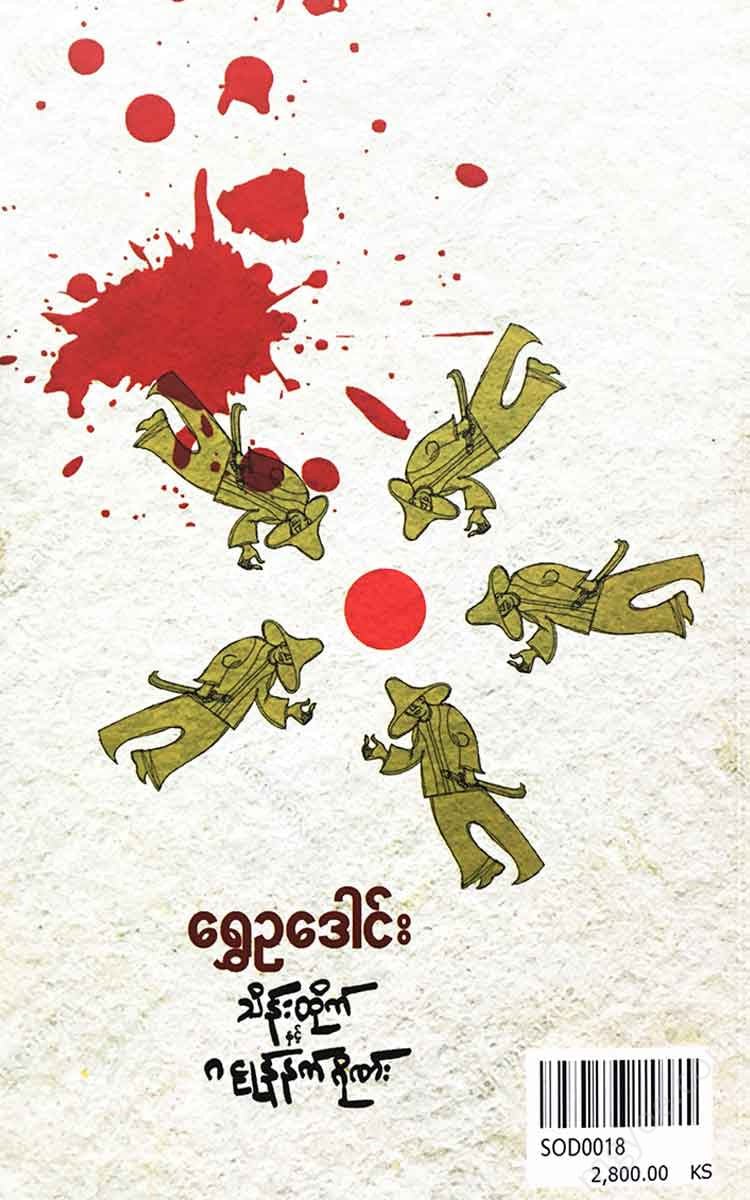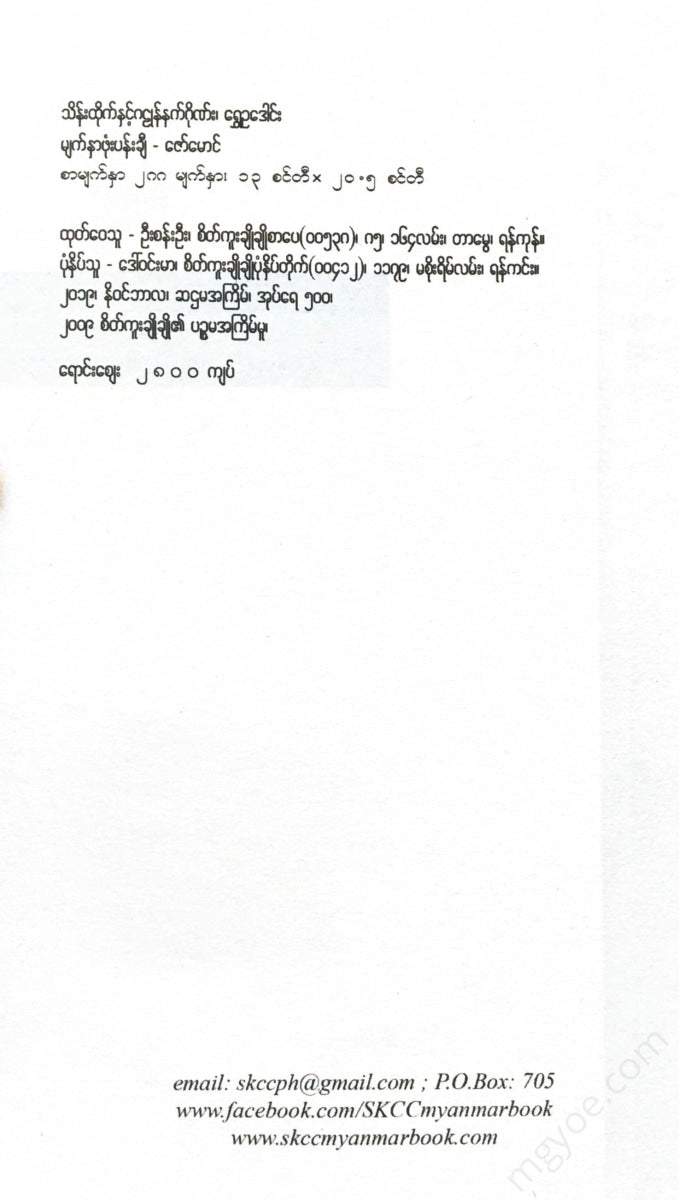စိတ်ကူးချိုချိုစာပေ
Golden Peacock - Thein Htaik and the Black Garnet Gang
Golden Peacock - Thein Htaik and the Black Garnet Gang
Couldn't load pickup availability
Introduction
On the 7th day of the full moon of the month of Ta Saung Mone in the Burmese calendar, the last king of Burma, King Thibaw, was attacked by the British government without any weapons of war or force. He was captured and taken to various villages with ease. After a month or so, one evening, a group of about (20) people, each on a horse, were riding rapidly along the banks of the Shwe Li River, a tributary of the Ayeyarwady River, to the upper right. Each of them was carrying a gun, each carrying a sword, and each carrying a dagger at his waist. Among them, the one who was riding in the front, riding a large, flowing robe, was more resolute than the common people, with a clean and white appearance, and a beautiful appearance. With his eyes, which were very bright and clear, and which, when he was angry, seemed to flash like fire, it was clear that he was the leader of this group and not a commoner. Moreover, when he encountered obstacles and obstacles in his work, it was clear to everyone who saw him that he was a man who would act with impunity, without even considering his own life or the lives of others. In fact, that group of people were a band of bandits, and he was a great bandit, and his name was Bo Tauk Tun.
Bo Tauk Tun was the son of a minister who had been greatly favored by the Burmese king. From his youth, he had a harsh and violent temper, and he associated with thieves and thieves. He was also very fond of fighting and was very fond of robbery. After being acquitted twice by his parents for murder, the third time he suddenly killed the son of another minister of the same rank as himself for a love affair. His parents could not save him. Bo Tauk Tun had to flee with a small amount of money from his mother and one of his father's horses. His father was deposed from his position because of his son's crime. Bo Tauk Tun did not return to his parents' place, but earned his living by robbery, which was his natural passion. When the name Bo Tauk Tun was heard on both sides of the river, everyone trembled with fear.
Bo Tauk Tun had invaded and attacked villages, hamlets, and even small towns on both sides of the river, and had already established a foothold in the country. When the British government had occupied the upper part of Burma, according to a report, Bo Tauk Tun and his 20 bandits had marched to the Shan region.
When they arrived at a forest camp, the horse-riding bandits boiled and ate the meat of the wild animals they had shot on their way, then drank the wild liquor they had filled with small pots until they were drunk, and then gathered around a large fire to sleep. Bo Tauk Tun, however, was lying on a small mat in a hut made by his disciples, discussing their plans for the journey with two or three older young men.
When midnight approached, he asked whose turn it was, and two of the guards were assigned to guard near the tent. Bo Tauk Tun, even though it was a cold season, would often get up from his bed and watch the guards sleep. If he fell asleep, he would be severely punished, so the guards would not sleep for half the night until their turn was over, and after midnight they would wake up the other two guards and go to bed. They traveled in this way every day, and when night came, they were supervised by guards, and they traveled continuously. After about ten days, they approached a small village on the border of Moe Meik.
Bo Tauk Tun and his 20 followers also camped in the same old way in a forest about a mile away from the small Shan village. After they had cooked and eaten, they called all their followers together and said,
“ My disciples, the reason I came to this Shan State is that I have heard that there is a large shrine in the center of the town of Moe Meik in the Moe Meik district. In this shrine, the Shan people hold a festival every year on this day of the month. I have also heard that one of the eyes of the statue in this shrine is a ruby and the other is a sapphire. At all times, this statue is kept in the palace of the chieftain, and when the festival arrives, it is moved to the shrine for three days and surrounded by guards. Tomorrow is the day of the festival, so early in the morning, the statue will be moved to the shrine, and tomorrow night it will be kept in the shrine and carefully guarded. The ruby in one eye of the statue is worth one hundred thousand. I have heard that in Shan, they call it “Thein Htike”. On the other hand, they say that the sapphire in the eye is worth ten thousand sapphires. So, we came to the shrine the next night to forcefully enter and take the two eyes from the statue.
When the young men heard the above words, some of them were not afraid or terrified, no matter how many people they had to fight, but they thought it was too terrifying to gouge out the eyes of a god and take them. When Bo Tauk Tun heard their groans, he stamped his heels on the ground...
“ What’s wrong? You’re complaining now, are you men or women? You’ve been accused of being male martyrs, and now I know it’s women. Did humans make the gods? Did the gods make humans? Tell me. You can’t talk to them like that. You… you scaredy-cat, get up…”
"If I had taken the gun, the young men would have been more afraid of Bo Tauk Tun than of the gods, so no one dared to get up, but lay down flat. One of them said, "According to their confession, if they had to go with the teacher, they would have dared to pierce not only the gods, but also the eyes of the gods of Sindhu and Brahma."
Then Bo Tauk Tun said, "It's okay, my teacher, don't be afraid of your students, aren't you going to kill them with a sword? Kai - Kai. It's getting late, go to sleep. My students have arrived in Shan territory tonight. Four guards are guarding each side," and then he entered his wooden hut.
The next day, at around midnight, about 20 Shan people, fully armed, were sleeping outside the shrine, guarding it. Near the shrine, about 10 Shan people were sleeping, and near the statue of the god, three Shan elders were keeping watch by lighting a lamp.
A guard outside the shrine heard a suspicious sound and, as he was about to wake up his companion, felt something cold against his cheek. He knew it was the barrel of a gun. He saw a man with one hand motioning for him to be quiet, and with the other hand pulling the trigger, threatening to shoot if he did not stay quiet. The Shan was in a state of shock. Meanwhile, a group of people gently shook the other guards with their hands to wake them up, and as soon as they woke up, they saw only the barrel of the gun. Within half a minute, one Shan bandit had already drawn a gun. When they were attacked, according to Bo Tauk Htun's order, each Burmese bandit had to shoot four Shan guards with his gun, while the rest of the men confiscated their weapons. Only five bandits guarded the twenty unarmed Shan guards, while the remaining fifteen and Bo Tauk Tun entered the shrine.
When they reached the shrine, a Shan guard was awake, so when he saw the robbers, he woke up his companions. The (16) robbers and (10) Shan guards fought with swords and weapons. Although the Shan people were quite skilled in swords and spears, they only learned to do so after being taught by a teacher, and had never fought before. The robbers, on the other hand, used their weapons frequently, and were very agile, so their skills were as different as their hands and feet, and they were also much more numerous. However, fearing that the other townspeople would wake up, they did not use guns, but fought with swords and weapons to defeat them.
Bo Tauk Htun did not wait until the end of the battle, but as soon as he knew that his men had defeated the Shan guards, he immediately called a servant and went to the statue. After cutting off one Shan chief who was about to attack him near the statue with a dagger and another with a free sword, he stabbed the Shan chief, who was covering the eyes of the statue with both hands, without hesitation, in the chest with his dagger. Then the Shan chief fell on his back and swore in the Shan language, “If you take the Teng Thing, you and all your relatives and friends will be cursed by me,” and then he died. Bo Tauk Tun, however, did not pay much attention to the words of the Shan king, but pierced the eyes of the deity with the tip of his dagger. "After taking the rubies and sapphires worth a thousand thousand, he called his servants who had already defeated the Shan guards, and before the city people gathered around him, they quickly ran to the horses, and then they forced the horses to ride through the forest.
Bo Tauk Tun was successful in retrieving the “Thien Htike Ruby” from the hands of the Shan people, but the curse of the dying Shan king regarding the ruby caused great suffering to his descendants, and the hardships that those who possessed it experienced, all readers will be able to guess at the end of this letter. Furthermore, this novel, unlike many other novels , does not describe everything that can be known, seen, heard, and reached everywhere according to the author’s imagination, but only describes what the participants in the novel saw and knew for themselves.





